|
Some Blogs
|

Private of the First Division
Kasimir Malevich
1914
_______________________
'Blanchot is not an ordinary man, a man whom you can meet in the street', says Levinas in an interview. But there he was on the streets, a demonstrator(Denis Hollier writes of his surprise at seeing him at an action committee, 'pale, but real ...'): what was Blanchot's role during May 1968, which he later called 'the most significant political and perhaps philosophical event in the last 20 years'?
- Spurious, Freedom of Speech: Blanchot and May 1968
Three remarkable pieces on Blanchot and May 1968 from Spurious -
A Literary Satellite: Blanchot and the Revue Internationale
Spurious
Immediate Speech
Spurious
There comes the moment in which, in Blanchot's image, the walls fall - in which the freedom of speech, understood as the response to the Other as the 'unknown-familiar' reveals itself in the open.
This, indeed, is what happened for Blanchot during the Events. Speech, for him, marks a relation to the Other that can be called immediate, as it escapes the constituting work of consciousness, answering to that worklessness (désoeuvrement) which roils in place of consciousness and its object.(....)
When the walls fall, the Other is revealed as being close to the night, close to death (dying being another word for worklessness, of a relation that escapes the constitutive work of consciousness).(....)
The revolt of May 1968, for Blanchot, was first of all a revolt of speech which the wall-writings and handbills confirm, answering as they do a capacity to say, to speak immediately that revealed itself in the action committees and demonstrations. But this is not an immediacy that places itself at my disposal - it is not revealed to a self that remains sure of its self and its capacities, including the capacity to be....(more)
_______________________

Johannes Backes via Junk for Code
_______________________
Here’s what I think: There are neither major nor minor tragedies. Tragedies exist. Some can be described. There are others for which every heart is too small. Those kind cannot fit in the heart.
- From: Sarajevo Blues, by Semezdin Mehmedinovic'
The Fountain Where One’s Name Is Changed
Notes from the Sarajevo Poetry Days Conference Kent Johnson
With excerpts from Sarajevo Blues, by Semezdin Mehmedinovic'
Photos by Forrest Gander
jacket
In the past decade, a few masters have taken to tapping exquisite designs into bullet and cannon shells, countless thousands of which littered the hills around the city after the war. Here smallish sniper’s shells with miniature lines of verse; here artillery casings the size of trash cans, bearing labyrinthine Moorish designs or pointilistic scenes of astonishing verisimilitude. So you see, says Kennan Ivanovic', pouring me thick coffee and turning back to tap away at great velocity, We honor in our art the dead....(more)
_______________________
Jazz Below the Water Line
James Leigh
ploughshares
In 1951, confronting a deceptively simple instrument on which to play with other rank amateurs, I had the wits to take a couple of classes at the Westlake School of Music in Hollywood. I could have skipped one of them, but the other, Harmonic Ear Training, proved the most valuable forty-five hours of instruction I would ever get in any subject. Westlake was full of vets on the GI Bill—a pleasant madhouse, and the madness was bebop....(more)
_______________________
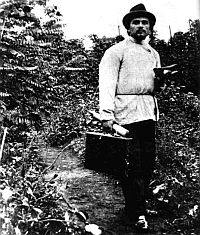
Kasimir Malevich
(February 23, 1878 – May 15, 1935)
photo found here
_______________________
"History and Event in the writings of Alain Badiou"
Quentin Meillassoux
Work-in-progress translation of Quentin Meillassoux, Histoire et événement chez Alain Badiou Intervention au séminaire « Marx au XXIe siècle : l’esprit & la lettre » Paris : 2 février 2008 [available here]
Keith Tilford
metastable equilibrium
Badiou thus refuses two antithetic positions: on the one hand that there would be eternal truths deprived for this reason of historicity - a position, say, characteristic of traditional metaphysics - and on the other hand that there would inversely not be any eternal truth, the entirety of discursive statements being irremediably inscribed in a historico-cultural context that strictly delimits the range of the particular instance that it supports. On the contrary, EE upholds that there exist many eternal truths, but that they are not unifiable within a metaphysical system, because they are distributed between the four procedures of truth which are science, art, politics, and love - philosophy itself not possessing the capacity to produce truths. But these truths, moreover, cannot exist in a Sky of Ideas: they are the result of an undecidable event and a fidelity of the subjects which attempt to investigate their world in its light. And LM will quite the reverse go on to say that any process deprived of truth is not historical in the true sense, but is reduced to a simple temporal modification without range for the truth and the subjects which adhere to it.
To elucidate the sense of these statements, we should preliminarily understand the two theses constitutive of a Badiousian philosophy:
1/ mathematics is ontology;
2/ any truth is post-evental. ...(more)
via the accursed share_______________________
 An Englishman in Moscow
Kasimir Malevich
_______________________
from
Erosion's Pull
Maureen Owen
Now This Vague Melancholy
Now this vague melancholy adores me
of hours spent in your facade
it's best described as she can
if she could likewise bitterly
since the forecast dented
with our diner window cut in two
, as if her life
her life dissolving
in what had been agreed
not to tell to one another
what was is the danger
the story of the stories
And this melancholy.
...(more)
Light & Dust Anthology of Poetry
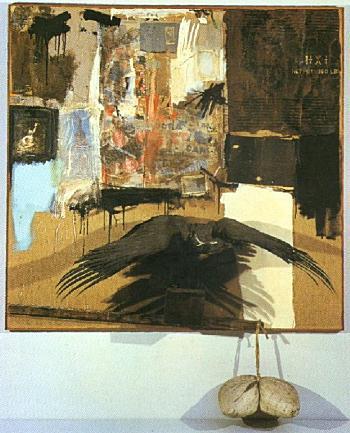
Canyon
Robert Rauschenberg
October 22, 1925 - May 12, 2008
Robert Rauschenberg, Titan of American Art, Is Dead at 82
Michael Kimmelman
Challenger: Rauschenberg Particles
Robert Gibbons
from the chapbook OF DC Rauschenberg's Combines
John Perreault I think there has always been a strain of poetry in Rauschenberg's art, maybe not the sad and mournful kind, but the exuberant, even prophetic kind. This is, after all, the man who spent a whole year making illustrations for Dante's Inferno. Is he against metaphor? Or against interpretation? Or just against bad poetry?
_______________________
Audio Interview with Donald Antrim
by Nigel Beale
talk(s) here about his mother’s death, Camus, writing on the edge, suffering and distraction, luxury beds, Donald Barthelme, anger, sarcasm, loss of humour, collecting books, and the appeal of first editions. Donald also treats us to a reading from The Afterlife, and as part of this, the dedication in Sir Philip Sidney’s Arcadia.
_______________________
The Anxious Landscape: [PDF]
the role of hysteria in perception and portrayal of the landscape
Donald Kunze
Abstract.
In The Idea of a Town, Joseph Rykwert contrasted Freud's accounts of an “anxious landscape,” the scene of hysteria, with a paradigm of the town as a place of memorious health and healing. Rykwert's reconnection of contemporary urban mentality with the violent origins of urban foundation rites nonetheless leads to the vision of the town as “a total mnemonic symbol … a structured complex of symbols; in which the citizen … identifi es himself with his town, with its past and its founders” (p. 189). The healing model allows Rykwert to develop a dichotomy between historical approaches to town planning. On one side is the “pattern” associated with the templum, the quadrated relation of microcosm to macrocosm established through ritual and renewed with annual observances. On the other is the instrumental city design, such as those promoted by Baron Von Haussmann, transforming the urban scene into a “great consumer's market, a workshop, an arena for ambitions.”
There seems no way to reconcile, in these terms, the need for collective memory with those forces of modernism that we know all too well and, rightly or wrongly, identify with psychosis. Yet, this dichotomy cuts off any useful discussion of the real relation of place to thought, where the latter is “externalized” as a material landscape and the former's coincidence of chance and teleology provides the mind with its most comprehensive model. I propose to pursue a model that recognizes, on one hand, the “unspeakable scandal” lying at the center of all urban foundations; and, on the other, the personal psychological need to fi nd, in the external landscape, a suitably complex place to play out the dynamic dramas of psychic symptoms. _______________________
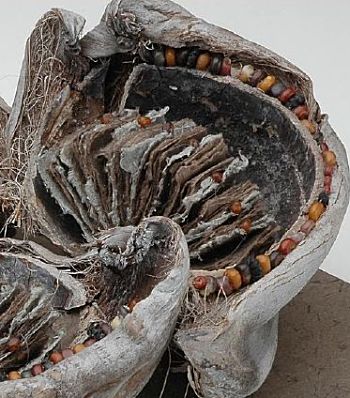 Ixchel's Dream
detail
The Spirit Book Series
[PDF]
Susan Kapuscinski Gaylord
photographs by Dean Powell Susan Kapuscinski Gaylord Susan's blog, in good spirit
_______________________
Why All of Our Efforts Won’t Stop the Attack on Iran
Gary Leupp
John McCain, Barack Obama, and Hillary Clinton (all of whom agree that an attack on Iran is “on the table”) will publicly approve. The media will call upon the same “military analysts”/military industry consultants who have been disseminating Pentagon propaganda for pay since 2002 to explain why the attack is justified and necessary. The main talking-point has been decided: “Iran is killing American soldiers in Iraq.” Public opinion polls will show the public divided, but a majority in support of the action because, regardless of their feelings about the war in Iraq, they want to “support our troops” and after all, Iran was asking for it by interfering in Iraq and attacking us.(....)
Voting for “antiwar” Democrats two years ago didn’t end the war. Even millions in the streets, peacefully demonstrating as the system encourages, didn’t prevent the assault on Iraq over five years ago. Now there’s no feasible mainstream-political recourse to stop an attack on Iran. And little time to mobilize mass demonstrations against it. It will come as a thief in the night, presented to the American people as a fait accompli. As the Bush-Cheney cowboys ride off into the sunset, smirkin’ and grinnin’ and slapping each other’s backs, the people will start to pay.
A character in Bertolt Brecht’s The Beggar’s Opera asks what’s worse—robbing a bank, or owning a bank? The system itself, that is to say, is the criminal product of wrongly acquired wealth, much of it obtained through imperialist war. Exposure alone, no matter how voluminous, eloquent and persuasive, will not change it....(more)
_______________________
Attack Iran? Why Not Just. . .
Russ Wellen
freezerbox
. . . paint targets on the backs of kids like those on PBS's "Carrier"?
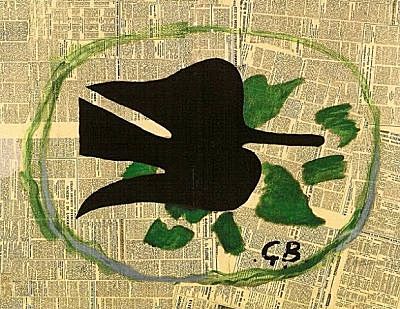
L’Oiseau dans le Feuillage
Georges Braque
May 13, 1882 - August 31, 1963
_______________________
Epicedium for Peace
J. Brian Long
And so rises this, our time of the high dividing
wall, our long dread while of the cinderblock
and razorwire castes: so tide the sermons
of the rabble: so the red-rattle deaths pull
crumpled, peel rotting, from the jags
of the rubble: so fall the siren-sung, warblown
martyrs, come the heat, come the rumble,
of the bread market blast: come night, come fire,
come the wailing of the veils, come black tithes
of ash cooling white on the pulpit of the sills:
come Sabbath, come mourning, come the call
for an eye for an eye, for a rip-trail tearing
in the fabric of the mosque: come the pounding
of the temples, come the engines of rhetoric
screaming blood before the afterburn, in
the arc-white flash of lightning jets: yes, come
these, come all, and each: a message: and each:
a word, and a symbol: O, save this, save this:
what purpose, what purpose does the dead child
serve? What serves the purpose of the dead child?
OCHO 20Guest edited by Kemel Zaldivar
Poems by
Gabriel Gudding, J. Brian Long, Nick Piombino, Oliver de la Paz, J.P. Dancing Bear, Nicole Mauro, Angela Armitage and Gabriel Siegel with The Story of Clyde as told by Kemel Zaldivar
_______________________
The Cult of the Presidency
Who can we blame for the radical expansion of executive power? Look no further than you and me.
Gene Healy
reason
The chief executive of the United States is no longer a mere constitutional officer charged with faithful execution of the laws. He is a soul nourisher, a hope giver, a living American talisman against hurricanes, terrorism, economic downturns, and spiritual malaise. He—or she—is the one who answers the phone at 3 a.m. to keep our children safe from harm. The modern president is America’s shrink, a social worker, our very own national talk show host. He’s also the Supreme Warlord of the Earth.
This messianic campaign rhetoric merely reflects what the office has evolved into after decades of public clamoring. The vision of the president as national guardian and spiritual redeemer is so ubiquitous it goes virtually unnoticed. Americans, left, right, and other, think of the “commander in chief” as a superhero, responsible for swooping to the rescue when danger strikes. And with great responsibility comes great power.
It’s difficult for 21st-century Americans to imagine things any other way. The United States appears stuck with an imperial presidency, an office that concentrates enormous power in the hands of whichever professional politician manages to claw his way to the top. Americans appear deeply ambivalent about the results, alternately cursing the king and pining for Camelot. But executive power will continue to grow, and threats to civil liberties increase, until citizens reconsider the incentives we have given to a post that started out so humble....(more)
via eye of the storm
_______________________
The Dark Well
R.S. Thomas
They see you as they see you,
A poor farmer with no name,
Ploughing cloudward, sowing the wind
With squalls of gulls at the day's end.
To me you are Prytherch, the man
Who more than all directed my slow
Charity where there was need.
There are two hungers, hunger for bread
And hunger of the uncouth soul
For the light's grace. I have seen both,
And chosen for an indulgent world's
Ear the story of one whose hands
Have bruised themselves on the locked doors
Of life; whose heart, fuller than mine
Of gulped tears, is the dark well
From which to draw, drop after drop,
The terrible poetry of his kind.
R.S. Thomas
1913 - 2000
some poems
_______________________
Place and Experience
Jeff Malpas
The idea that the self is be discovered through an investigation of the places it inhabits is the central idea in Gaston Bachelard's The Poetics of Space and Bachelard talks of both the love of place "topophilia" and of the investigation of places "topoanalysis" as essential notions in any phenomenological/psychoanalytic study of memory, self and mind. In Bachelard, the life of the mind is given form in the places and spaces in which human beings dwell and those places themselves shape and influence human memories, feelings and thoughts. In this way, the spaces of inner and outer "of mind and world" are transformed one into the other as inner space is externalised and outer space brought within. In this respect, Merleau-Ponty seems to express an idea found in Bachelard, as well as in his own work, when he writes that "The world is wholly inside and I am wholly outside myself" and at the same time suggests a breakdown in the very dichotomy that is invoked. The stuff of our "inner" lives is thus to be found in the exterior spaces or places in which we dwell, while those same spaces and places are themselves incorporated "within" us. Proust's Remembrance of Things Past can be seen as a special exercise in the exploration of such places, and thus as an exercise in somethinglike the topoanalysis described by Bachelard, although it is an analysis of place that looks, not only to the intimacy of the enclosed spaces of cupboard, room and home, but also to the larger space of the garden, the village, the city, the plain, the sea and the sky. And, like Bachelard, Proust presents such topoanalysis as an exploration of our own selves as well as an exploration of love through an exploration of place = in Proust we find topophilia writ large.
(....)
We cannot avoid tryingto think through the diversity of issues that surround the idea of place, and our belonging to it, in some sort of unitary fashion. It is just such a project of tryingto understand place that is the project, perhaps the overly ambitious project, which I intend to pursue in the following pages. Although I will draw on a variety of sources – to some of which I have already alluded – my aim will not be simply to present the idea of place as it might appear in different and juxtaposed ways in literature, psychology, geography, philosophy and so forth. Instead I will aim to set out a way of thinkingabout place that, while mindful of the complexity and ambiguity of the concept, explicates its relation to other concepts, includingthose of space, time and self, and that also provides some elucidation and explanation of what might be called ‘Proust’s Principle’ (it could equally be Wordsworth’s) of the place-bound identity of persons.
pdf download available here _______________________
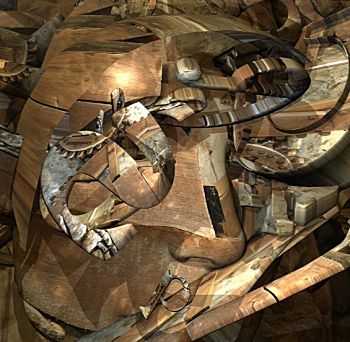
Robot poet
of unimaginable consequence
detail
Peter Ciccariello
Invisible Notes
_______________________
Things exist rooted in the flesh,
Stone, tree and flower. . . . Space and time
Are not the mathematics that your will
Imposes, but a green calendar
Your heart observes; how else could you
Find your way home or know when to die. . . .
—
R. S. Thomas, “Green Categories”
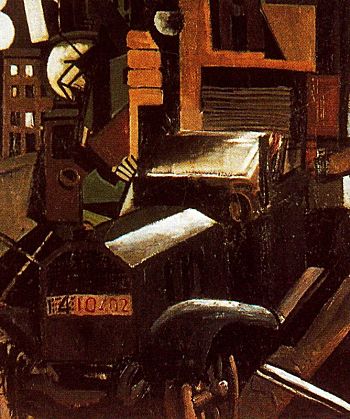
Il camion
1914-1915
Mario Sironi
(May 12, 1885 – August 13, 1961)
_______________________
Our conclusion is that, if humanity wishes to preserve a planet similar to the one on which civilization developed and to which life on Earth is adapted, CO2 must be reduced from its present 385 ppm (parts per million) to, at most, 350 ppm.
-
Jim Hansen
The World at 350
A Last Chance for Civilization
Bill McKibben
There's a number -- a new number -- that makes this point most powerfully. It may now be the most important number on Earth: 350. As in parts per million (ppm) of carbon dioxide in the atmosphere. (....)
Hansen's words were well-chosen: "a planet similar to that on which civilization developed." People will doubtless survive on a non-350 planet, but those who do will be so preoccupied, coping with the endless unintended consequences of an overheated planet, that civilization may not.
Civilization is what grows up in the margins of leisure and security provided by a workable relationship with the natural world. That margin won't exist, at least not for long, this side of 350. That's the limit we face. ...(more)
via Mike GolbyYBLOG ZA
_______________________
grammatology
for anthony robinson
Erica Kaufman
i want sentences. to make sense.
in the post post post structuralist way.
want barbie to topple. the way she
should. want my hands to age.
the redness to be arthritis not
frostbite. want to use apostrophes
as commas because nothing.
is that possessive. i used to hoard
old sneakers. a kid with candy
in the closet. now i fill trash bags
with clothes that fit. i like this
showing. like you in all
your languages. body. bullets.
paragraphenalia. today i think.
waist. want. put on. my cargo
shorts and strut between
couch and computer. between
balance and overdrawn.
i feel like a checkbook
missing monthly interest.
i know it's there. acquired.
never met. i never thought
about barbells. about piercing
my nipples. the ringlets small.
i miss. i am miss. admit to singular.
can't conjugate smitten. alone.
Erica Kaufman - 5 PoemsGowanus
Al Filreis has more links for Erica Kaufman
_______________________
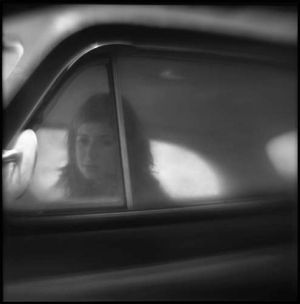
Susan Burnstine
1 2 3
_______________________
It is in the admission of ignorance and the admission of uncertainty that there is a hope for the continuous motion of human beings in some direction that doesn't get confined, permanently blocked, as it has so many times before in various periods in the history of man.
-
- Richard P. Feynman
May 11, 1918 - Feb. 15, 1988
_______________________
Mohammad Vs Mesmer
Gary Sullivan on K. Silem Mohammad and Sharon Mesmer
Elsewhere
By the lights of many in the American poetry world, K. Silem Mohammad and Sharon Mesmer are the leading poets of our day, though it's hard to find anyone who will declare them equally great. (I'm an exception.)(....)
Collaged poetry, including that of flarf masterworks, is hard to contemplate. It is hard even to read. Our brains are wired to make sense of meaning shining through words, not falling upon them. When presented with variable sources, we automatically select the most meaningful, consigning the rest to shadow.
Effects of collage-ignited language swamp those of traditional composition and depicted imagery. What do we actually absorb amid the singing marvels of Mesmer's "I Chose the Wrong Power Animal" or Mohammad's "Do We Need Goddess Language?", to cite perhaps the finest from each of these recent books? ("But that's kitschy!" Mesmer scoffed, when I mentioned "Goddess Language.")
My own keenest pleasure in flarf occurs at first glance—a "Wow!" moment, like the here-and-gone dazzle of fireworks. To be sustained, the experience calls for an organizing idea, a ruling fiction, making disorientation meaningful.
Mohammad and Mesmer have addressed that need, in ways both hypermodern and attuned to Gothic wisdom. Mohammad's Edge book delivers an incessant first impression. You are always just beginning to behold it, in a mental state that is at once unfocussed and undistracted. Persisting, you may sense slight changes in the day's light—tiny, barely registered visual thunderclaps:
I think I know what you're "trying" to say,
but I'll answer what you actually "said"
boundary estuarys are entrusted precisely
that the hat projector Manama parachute
team parachutes projector undo scarab
"has anybody seen an empire?" ...(more)
_______________________
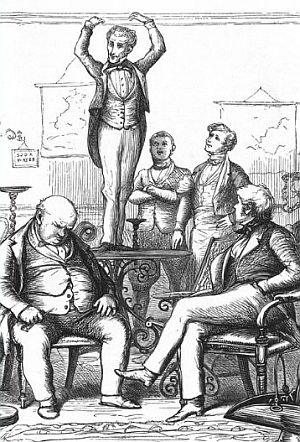
‘There is nothing like iron, Sir; nothing.’
John Everett Millais
.....................................................
The Centrality of Literary Illustration in Victorian Visual Culture
the example of Millais and Trollope from 1860 to 1864
David Skilton
It is easy to assume that literary illustration is an addition to works of prose fiction or poetry, serving to embellish them, partly for the sake of sales, and partly because the images are pleasing to the lover of books. It is often further suggested that illustrations may have helped communication between a writer and sections of his or her public more adept at reading images than complex verbal texts. This article11 This article was first delivered as a paper at the conference, ‘Pictures of Modernity’, held at the Ca’Foscari University, Venice, 10 to 11 May 2007. Venetian references in the opening paragraphs were chosen over other possible examples as a compliment to the hosts. sets out to demonstrate that far from being the minor cultural form these assumptions presuppose, literary illustration in fact occupied a central place in Victorian visual and verbal culture.
The Journal of Illustration Studies
_______________________
Twenty five years after Baudrillard, these poetry students were still prioritizing Romantic notions of authenticity -- "truth", "individuality" and "honesty" -- over any other form of expression. My god! Is it a case of naivety, amnesia or just plain ignorance?
- Kenneth Goldsmith, To Be (Un)Real
.....................................................
System Says
(for Linh Dinh)
Tony Tost
System says: instead of a split between a body and a soul—where the soul is pacified to better utilize the body for its laboring potential—you will now have a split between body and identity.
System says: your sense of identity is to be pacified (by the simulation of its endless distribution: we're infinitely adaptable and changeable minute-to-minute) to better utilize your body for its producing/consuming potential.
System says: the assumed updating loop of promise-and-satisfaction is how you transform yourself into a multitude of digital selves, each self linking up with the appropriate system of desire production and satisfaction.
System says: each created identity helps open one’s physical body so I may apply its newest desire and satisfaction updates.
System says: the plural identity “you” is free to disperse itself in a multiplicity so the bodily “you” can get back to work.
System says: the status quo is always one step ahead....(more)
and further
_______________________
Modes of philosophizing
A round table debate
Jonathan Barnes, Myles Fredric Burnyeat, Raymond Geuss, Barry Stroud
eurozine
Should philosophy have something to say to non-philosophers? Should philosophy be pursued only by those trained in philosophy? Should academic teachers of philosophy consider themselves philosophers in virtue of the fact that they teach philosophy? And should analytic philosophers deny that continental philosophers are philosophers at all, or acknowledge that they represent different modes of philosophizing? Cogito poses some big questions to four prominent British and US philosophers.
_______________________
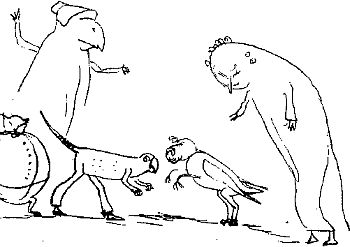
The 2 venerable Jebusites
fasten the remains of
Mr. Lear, the Polly and the Pusseybite,
but fail to reconstruct them perfectly as 3 individuals.
The Adventures of Mr. Lear, the Polly and the Pusseybite
on their way to the Ritertitle Mountains
Edward Lear
12 May 1812 - 29 January 1888 Victorian Trickster:
A Jungian Consideration of Edward Lear's Nonsense Verse
Clifton Snider
_______________________
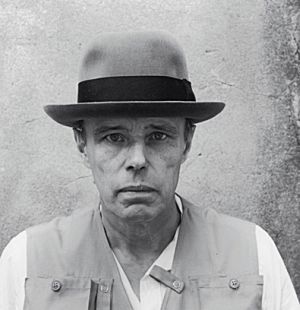
Joseph Beuys
May 12, 1921 – January 23, 1986
photo - Arnaud Maggs
Joseph Beuys at UbuWeb Sound and Film .....................................................
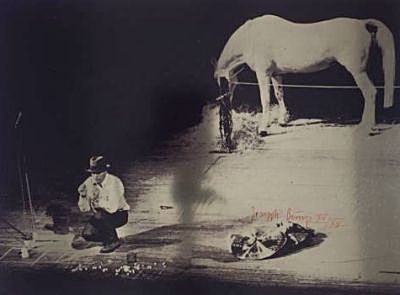
Iphigenia
Joseph Beuys
1973
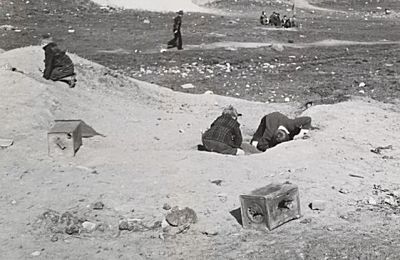
Rudy Burckhardt Rudy Burckhardt - An Afternoon in Astoria
MoMA
_______________________
Rudy Can’t Fail
Swiss-born artist Rudy Burckhardt put poets on film and made photos work like sonnets.
Jordan Davis
the Poetry Foundation.
The New York School poets made a big deal about art and artists, but there was only one photographer they abducted.(....)
The mutual discoveries of form that Burckhardt shared with the poets he knew are tangible; this insight into friendship and feeling is invaluable. Readers of the manuscripts of the poets mentioned here will find them illuminated in Burckhardt’s work. All poets should be so lucky....(more)
A Day In the Life of Two Artists
The Art of Yvonne Jacquette and Rudy Burckhardt
Vincent Katz milk magazine
Rudy Burckhardt's Maine
The Cinema of Looking
Rudy Burckhardt and Edwin Denby
in conversation with Joe Giordano
jacket
Rudy Burckhardt: The Art of Being Phong Bui
brooklyn rail
_______________________
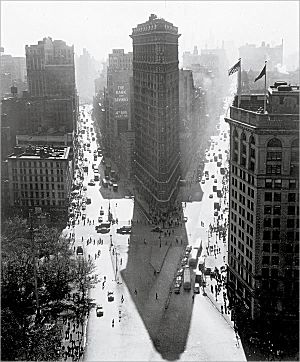
Flatiron Building
Rudy Burckhardt
_______________________
How I think I made some of my photos and paintings
Rudy Burckhardt
With a square-format camera -- it was a great relief you didn't have to make that awful decision: horizontal or vertical? -- I began to climb 20- or 30-story buildings. A little like climbing the Alps, but with an elevator. From a wide, flat, roof, you might get unexpected, exhilarating, views, of other buildings -- some higher, some lower -- water towers, columns, ornaments, smoke, shadows, and tiny traffic down in the canyons -- all pieced together by man -- innumerable, anonymous, busy creatures who had no idea of what it would all add up to.
At the same time, I began finding photography too fast, too instantaneous: you look around, perceive a situation as a picture, the shutter clicks, and it's done. Instant composition. It's not occupying like making a painting, which develops as you're doing it, not an instant reproduction of something you saw at one time before you.
It turned out having made photos first was a handicap; I had to unlearn the habit of instant composition....(more)
How I think I made some of my filmsRudy Burckhardt
How did I meet Edwin?
Rudy Burckhardt
_______________________
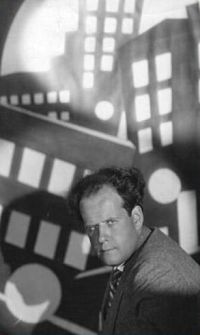
Sergei Eisenstein
Photo by Eugene Robert Richee
.....................................................
Five Feuilletons on Sergei Eisenstein
Viktor Shklovsky
Translated from the Russian by Adam Siegel
Context
a triquarterly publication intended to create an international and historical context in which to read modern and contemporary literature
_______________________
Walter Benjamin~ Overpowering Conformism
Esther Leslie
Using here the phrase ‘overpowering conformism’ flags a desire to wrest Benjamin from a conformism inherent in those appropriations that excise him from a culture of engaged political critique. ‘Overpowering conformism’ suggests a confrontation with domesticating readings of Benjamin’s work. Wresting Benjamin’s writings from the conformism that threatens to overpower their reception is the task. Such an assignment is aided by taking cognizance of Benjamin’s onslaught on a second conformism mentioned in ‘Über den Begriff der Geschichte’ – the conformity of reformist theory and practice.2 Reformism is still the conformity that overpowers the supposedly critically-minded. Nowadays it is frequently reformist-minded theorists who see reflected in Benjamin their own defeatist melancholy and desperate half-hope that, ameliorated by their wishful thinking, things might just work out for the best in the end, somehow. No major shake-ups intended. This is quite contrary to Benjamin’s intent. In his final notes on the concept of history, Benjamin attacks reformist political tactics and economic delusions for their bypassing of the insurgent, self-organized moment of proletarian revolution. download full text here
_______________________
Giving an Account of Oneself
Judith Butler
pdf download link
... according to the kind of theory I have been pursuing here, what will responsibility look like? Haven’t we, by insisting on something non-narrativizable, limited the degree to which we might hold ourselves or others accountable for their actions? I want to suggest that the very meaning of responsibility must be rethought on the basis of this limitation; it cannot be tied to the conceit of a self fully transparent to itself.1 Indeed, to take responsibility for oneself is to avow the limits of any self-understanding, and to establish these limits not only as a condition for the subject but as the predicament of the human community. I am not altogether out of the loop of the Enlightenment if I say, as I do, that reason’s limit is the sign of our humanity. It might even be a legacy of Kant to say so. My account of myself breaks down, and surely for a reason, but that does not mean that I can supply all the reasons that would make my account whole. Reasons course through me that I cannot fully recuperate, that remain enigmatic, that abide with me as my own familiar alter- ity, my own private, or not so private, opacity. I speak as an ‘‘I,’’ but do not make the mistake of thinking that I know precisely all that I am doing when I speak in that way. I find that my very formation implicates the other in me, that my own foreignness to myself is, paradoxically, the source of my ethical connection with others. Do I need to know myself in order to act responsibly in social relations? Surely, to a certain extent, yes. But is there an ethical valence to my unknowingness? _______________________
Ontotheological Turnings?
Marion, Lacoste And Levinas On The Decentring Of Modern Subjectivity
Joeri Schrijvers
Modern Theology 22:2 April 2006
article available here
_______________________
Wittgenstein's Conception Of The "Willing Subject"
Elias Baumgarten
download here
_______________________

Rocket
photographs from Montreal
My Digital Identity
Presentation
May 6, 2008
Delivered to e-Portfolios, Montreal, Canada
Stephen Downes
_______________________
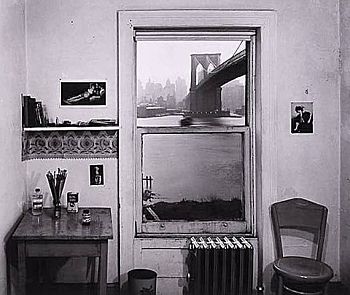
A View from Brooklyn II
Rudy Burckhardt
_______________________
Reading Theory Today
Pierre Joris in Milk Mag
I admit that I merely flicked
through Being and
Nothingness I have never regretted
the disengagement this encourages
for art, offering images,
a consolation rather than
a challenge, is an evasion
of responsibility, leaving that
up to criticism and its attendant
concept talk. He slipped on
a deep mistrust of banana heels
while she slipped into
something more confusing that
clung to her thoughts like
imaginary hypnotic inertia.
It is difficult he opined to
make contact with the real
world, and yet that is the
only chance we have. A theo-
rhetorical S.O.S. if ever there
was none. He tells of the
ineffable.
from: meditations on the 40 stations of Mansour Al-Hallaj
two more
_______________________
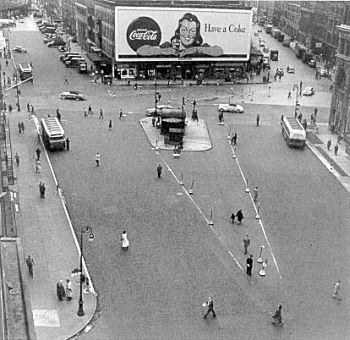
Astor Place
Rudy Burckhardt
1947

Seascape
Gustave Le Gray
ca. 1855 Gabriel Cromer Collection
George Eastman House
_______________________
"The Rider"
Sarah Manguso
Some believe the end will come
in the form of a mathematical equation.
Others believe it will descend as a shining horse.
I calculate the probabilities to be even at fifty percent.
Either a thing will happen or it won't.
I open a window,
I unmake the bed.
Somehow, I am moving closer to the equation
or to the horse with everything I do.
Death comes in the form of a horse
covered in shining equations.
There will be no further clues, I see.
I begin to read my horse.
The equations are drawn in the shapes of horses:
horses covered in equations.
I am tempted to hook an ankle
around the world as I ride away.
For I am about to ride far beyond
the low prairie of beginnings and endings.
from The Captain Lands in Paradise
.....................................................
Review of The Captain Lands in Paradise by Sarah Manguso
Charlotte Mandel
thanks to Rob Mclennan
_______________________
Once Only
almost at the equator
almost at the equinox
exactly at midnight
from a ship
the full
moon
in the center of the sky.
Gary Snyder
_______________________
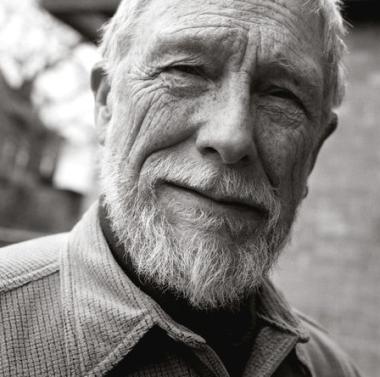
Gary Snyder
(born May 8, 1930)
winner of the Ruth Lilly prize
$100,000
Gary Snyder @ Poetry In Revolt
Gary Snyder at the Blue Neon Alley
Buddhist Anarchism
Gary Snyder
1961
Poets on the peaks: Snyder, Muir, Kerouac, Whalen
Riprap
Gary Snyder
Lay down these words
Before your mind like rocks.
placed solid, by hands
In choice of place, set
Before the body of the mind
in space and time:
Solidity of bark, leaf, or wall
riprap of things:
Cobble of milky way.
straying planets,
These poems, people,
lost ponies with
Dragging saddles --
and rocky sure-foot trails.
The worlds like an endless
four-dimensional
Game of Go.
ants and pebbles
In the thin loam, each rock a word
a creek-washed stone
Granite: ingrained
with torment of fire and weight
Crystal and sediment linked hot
all change, in thoughts,
As well as things.
_______________________
Unraveling Identity
Watching the Posthuman Bildungsroman
Davin Heckman
ctheory
... the purpose is to talk about a sensibility: a way of experiencing reality and its absence. I have been puzzling lately over a genre of film which is hard to situate: films which deal with forgetting and remembering, in which we ride shotgun with protagonists who are just as interested in character development as we are. While the genre itself has not been fully mapped out, potential candidates for inclusion include Abre Los Ojos (1997), Vanilla Sky (2001), Memento (2000), Minority Report (2002), The Bourne Identity (2002), Paycheck (2003), Eternal Sunshine of the Spotless Mind (2004), and, most recently, A Scanner Darkly (2006). I call this genre the "Posthuman Bildungsroman."...(more)
_______________________
Memory/Incision, or as it is now called, Touch Me
Joseph Cooper
Provisional membrane injured thread. Flush of ink and patterned sentiment. Formula is chemical process of integration. The feeling in my forehead burns like a dream.
The borderline patient is laborious, barricaded and untouchable.
The Dusie Kollektiv Chapbook Series
Jacket
_______________________
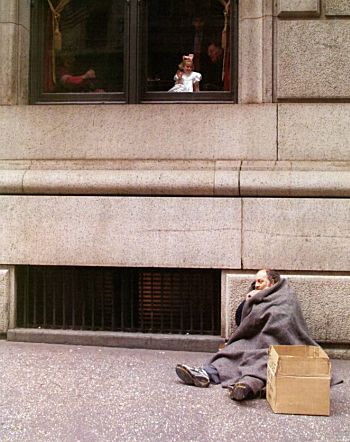
Fifth Avenue
detail
Joel Meyerowitz
1 2 3 4
_______________________
War of the Classes
Jack London
1905
Project Gutenberg
_______________________
Dictionary Of The Vulgar Tongue
A Dictionary Of Buckish Slang, University Wit, And Pickpocket Eloquence
1811
_______________________
The Dictionary of the History of Ideas
Studies of Selected Pivotal Ideas, edited by Philip P. Wiener
Digital Collections at UVA
_______________________
Top 100 User-Centered Blogs
Jessica Hupp
via archizoo
_______________________

Express Détective Nadar
Tropical Model
1888 - 1892
Photographic Apparatus from Cromer
George Eastman House
_______________________
Why I Take Good Care Of My Macintosh Computer
Gary Snyder
Because whole worlds of writing can be boldly layed out
and then highlighted, & vanished in a flash at
"delete" so it teaches
of impermanence and pain;
& because my computer and me are both brief
in this world, both foolish, and we have earthly fates,
Because I have let it move in with me
right inside the tent
And it goes with me out every morning
We fill up our baskets, get back home,
Feel rich, relax, I throw it a scrap and it hums.
...(more)
_______________________
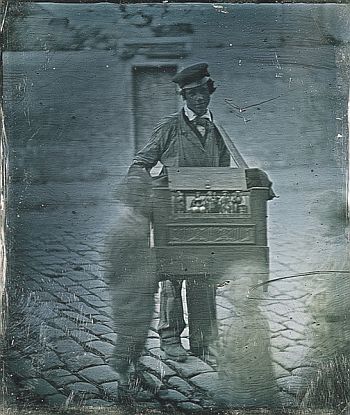
Organ Grinder
ca. 1848
Gabriel Cromer Collection
George Eastman House

Luigi Russolo
1885 - 1947
Luigi Russolo (left) and his assistant Ugo Piatti
with their 'Intonarumori', 1913
The Italian Futurist, Luigi Russolo came to sounds from painting through poetry. Russolo invented a series of individual instruments 'Intonarumori'. They were named and categorized according to their sound, its pitch, frequency, and intensity —creating a music that let the instruments "speak for themselves". Russolo presented his musical theories in a manifesto entitled 'L'arte dei rumori' (The Art of Noises) in 1913 (12). The noise-generating instruments (hand-activated large scale boxes with megaphones attached) allowed the inclusion of 'noise' into musical composition. Russolo's first 'art-of-noises' concert for 18 'Intonarumori', caused a huge scandal in Milan (1914).Art and Synesthesia: in search of the synesthetic experience
Dr. Hugo Heyrman
The Art of Noise (futurist manifesto, 1913) [PDF] Luigi Russolo translated by Robert Filliou
Luigi Russolo's audio in UbuWeb Sound
_______________________
Love Thy neighbour? The Political Economy of Musical Neighbours
Ian Biddle
Radical Musicology
The muffled thunder of dialogue comes through the walls, then a chorus of laughter. Then more thunder. Most of the laugh tracks on television were recorded in the early 1950s. These days, most of the people you hear laughing are dead.
The stomp and stomp and stomp of a drum comes down through the ceiling. The rhythm changes. Maybe the beat crowds together, faster, or it spreads out slower, but it doesn’t stop.
Up through the floor, someone’s barking the words to a song. These people who need their television or stereo or radio playing all the time. These people so scared of silence. These are my neighbours. These sound-oholics. These quiet-ophobics.
Laughter of the dead comes through every wall.
These days, this is what passes for home sweet home.
This siege of noise.
- Chuck Palahniuk, Lullaby
Chuck Palahniuk’s characterisation of what might be termed the neighbourly ‘relation in sound’ in his short novel, Lullaby (2002), is interesting not just for its intensity, its hyperbolic elaboration of a problem anyone living in cities will have encountered, but also for its commitment to consistent and sustained examination of that relation: the neighbour is noisy, the neighbour is malign, the neighbour is always plural, a horde. The tabloid press, of course, feeds on the scenario that torments us most; like Palahniuk, they are attracted to the extreme cases of neighbour dispute, especially around noise, because these stories tap into a fear at the core of the urban imagination of developed capitalist societies, a fear both of isolation, and of vulnerability to the malevolence of the other. And when that other walks among us, when s/he is no longer efficiently marked out as different to us, then we are doubly anxious, doubly nervous about the deadly potential of the neighbour, since that potential is written into every face, lurks round every corner....(more)
_______________________
A Practice Without Center: the Work of Sophie Calle
Stacy Oborn
the space in between
I have spent an inordinate amount of energy and effort trying to determine whether who I am about to write about is worth all or any of this time and effort. Usually I use this space to write about what is stirring me most, what is making me think, getting me to look. And really, Sophie Calle’s work accomplishes all of those things–but the stirring, the thinking, the looking that it precipitates has been of the order that leads by stellar negation of every guiding principle in art or raison d’etre that I possess. In short, she represents everything I maintain to be totally, totally wrong with photography and, by extension, the artworld-at-large.
What I want to write about is messy, provocative, full of quasi-moralistic and ethical slippery slopes. It will undoubtedly end up revealing many of my own prejudices, biases, and weaknesses, but in exchange for that it is my hope that it begins a dialog concerning some if not all of the following questions: ...(more)
via Tim Atherton
Sophie Calle
1 2 3 4
_______________________

tulip festival
photo - mw
_______________________
For all the history of grief
An empty doorway and a maple leaf.
For love
The leaning grasses and two lights above the sea--
Archibald MacLeish
(May 7, 1892 - April 20, 1982)
from Ars Poetic

Helmbrechts walk
Susan Silas
via Tim Atherton
"... a visual representation of the act of walking through a landscape marked by the historical specificity of the forced march of 580 Jewish women prisoners at the end of the Second World War. This book is a document of that endeavor - walking for 22 days and 225 miles in Germany and the Czech Republic on the fifty third anniversary of those events."
_______________________
Uncanny Landscape
Jean-Luc Nancy
Translated by Jeff FortUncanny estrangement occurs in the suspension of presence: the imminence of a departure or an arrival, neither good nor evil, only a wide space [largeur] and a generosity [largesse] that allow this suspension to be thought and to pass.
For this suspension is always a question of a passage or a passing on. A landscape is always a landscape of time, and doubly so: it is a time of year (a season) and a time of day (morning, noon, or evening), as well as a kind of weather [un temps], rain or snow, sun or mist. In the presentation of this time, which unfolds with every image, the present of representation can do nothing other than render infinitely sensible the passing of time, the fleeting instability of what is shown. Every cloud has its own peace, but this peace is so properly its own that it has such a peace—everything shows this— only at the moment when this cloud has not yet become another, and with it the entire landscape, which incessantly estranges and unsettles.
A landscape is always the suspension of a passage, and this passage occurs as a separation, an emptying out of the scene or of being: not even a passage from one point to another or from one moment to another, but the step [le pas] of the opening itself. This step is the immobilization in which forward movement is grasped as a basis or a ‘‘footing,’’ a span of the hand, the marking out of a measure accord- ing to which a world can be laid out. The walker stops, and his step becomes that of a compass, the angle and amplitude of a disposition of space, on whose step—at whose threshold, at whose point of access— a gaze presents itself as a gaze. from The Ground of the Image
Jean-Luc Nancy
Translated by Jeff Fort
downloadable here
_______________________
In the dark times, will there also be singing?
Yes, there will be singing
About the dark times.
--
Bertolt Brecht, "Motto"
Singing in dark timesErica Funkhouser Harvard Review, Dec, 2005_______________________
 photo - mw
_______________________
The House In The Woods
Randall Jarrell
At the back of the houses there is the wood.
While there is a leaf of summer left, the wood
Makes sounds I can put somewhere in my song,
Has paths I can walk, when I wake, to good
Or evil: to the cage, to the oven, to the House
In the Wood. It is a part of life, or of the story
We make of life. But after the last leaf,
The last light--for each year is leafless,
Each day lightless, at the last--the wood begins
Its serious existence: it has no path,
No house, no story; it resists comparison...
One clear, repeated, lapping gurgle, like a spoon
Or a glass breathing, is the brook,
The wood's fouled midnight water. If I walk into the wood
As far as I can walk, I come to my own door,
The door of the House in the Wood. It opens silently:
On the bed is something covered, something humped
Asleep there, awake there--but what? I do not know.
I look, I lie there, and yet I do not know.
How far out my great echoing clumsy limbs
Stretch, surrounded only by space! For time has struck,
All the clocks are stuck now, for how many lives,
On the same second. Numbed, wooden, motionless,
We are far under the surface of the night.
Nothing comes down so deep but sound: a car, freight cars,
A high soft droning, drawn out like a wire
Forever and ever--is this the sound that Bunyan heard
So that he thought his bowels would burst within him?--
Drift on, on, into nothing. Then someone screams
A scream like an old knife sharpened into nothing.
It is only a nightmare. No one wakes up, nothing happens,
Except there is gooseflesh over my whole body--
And that too, after a little while, is gone.
I lie here like a cut-off limb, the stump the limb has left...
Here at the bottom of the world, what was before the world
And will be after, holds me to its back
Breasts and rocks me: the oven is cold, the cage is empty,
In the House in the Wood, the witch and her child sleep.
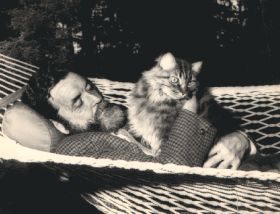
Randall Jarrell
May 6, 1914 - October 15, 1965
ca. 1964 - with cat, Elfi
Randall Jarrell Collection
Jarrell, the mother, the marchen
Alan Williamson
Twentieth Century Literature, Fall, 1994
"There is one story and one story only," Randall Jarrell was fond of quoting, from Robert Graves, about those poets whose enabling obsessions he felt he had penetrated to their depths. It was true of many of them, but truest of all of himself. Appropriately, since he was the most consciously psychoanalytic even of the poets of the "confessional" generation, his is a story that resonates with the earliest, most forgotten experiences of life, and with the senses of identity, relationship, and gender that begin to be formed there. To understand it is to understand why Jarrell's poetry has been accused of sentimentality, and why, at its most incandescent moments, it completely transcends that accusation.
_______________________
The Dream of Our Youth
Scott Esposito on Roberto Bolaño
HermanoCerdo
The fact that a dead Latin American who wrote somewhat difficult fiction managed to become the hot new thing is nothing short of amazing. Americans are notoriously disinterested in reading translations-it’s estimated that a scant 3 percent of all books published every year in the U.S. are translations (compared to between 10 and 25 percent for most Western European nations) - and since Bolaño is inconveniently dead, he was unable to come here on a book tour, do interviews on National Public Radio, or even say something inappropriate to stir up a proper controversy. The last foreigner I can remember who received nearly as much attention as Bolaño did last spring is Orham Pamuk, but he only got it after being awarded a Nobel and fighting a high-profile censorship trial with his government....(more)
_______________________
Rosa Luxemburg’s Shock Doctrine
Ron Jacobs
Naomi Klein’s 2007 release Shock Doctrine addressed in a rather mild way the dependence of the capitalist economy on cataclysmic events for its progress. These events displace millions and cause personal hardship for an even greater number while they ensure capitalism’s survival. A century ago, there was another woman who took this observation further and devoted her life to ending capitalism....(more)
Rosa Luxemburg (1870 - 1919) Internet Archive
_______________________
Those Chickens: The Economic Crisis and America’s Poor and Struggling
Michael Blim
3quarksdaily
It’s better to be rich – hardly a surprising claim.
But it is devastating to be poor, and this period of economic crisis it is deadly to be poor.(....)
In a society without justice such as ours, poor people, people with one foot out of poverty, and the working class are experiencing a crisis only guessed at on Wall Street where all the mischief began. Those becoming stricken by the crisis -- they indeed are the chickens that are coming home to roost. Only for them, it is simply for delivery to Tyson’s.
_______________________
Dying for the Rich
Insecurity breeds stress, disease.
Our income gap is really a life and death health issue.
Crawford Kilian
the Tyee
_______________________
The Gospel of Consumption
Jeffrey Kaplan
_______________________

Farewell to the chateau
Matuska Medouz
photosight.ru
_______________________
How is Literature Possible?
Maurice Blanchot
Why this fear of commonplaces? It is because, according to terrorist critics, cliches are a sign of laziness and inertia. The writer who takes refuge in them revels in a kind of indolence which subordinates him to ready-made forms. He still believes he is thinking for himself; this is his mistake. He accepts a succession of words which imposes a fixed order upon him and narrowly confines his thought. The use of commonplace expressions thus leads to a serious abuse, which is verbalism. The author who is a victim of conventional sentences is no longer in control of what he is saying. And his words, triumphing over the exact meaning to which they ought to correspond, rebel against the mind which attempts to guide them, weigh upon it with all of their brute force, and make it aware of how degradingly all-powerful that force is. If we reflect on certain words, such as freedom, democracy, order, and on the disorderliness that can result if they are used carelessly, it becomes clear to us that writers have good reason to be vigilant in preventing a facile subservience. Apparendy given over to licence and anarchy, they are in fact engaged in repudiating chance, darkness, confusion, destroying idols and battling with monsters. Terror, in brief, as the enemy of commonplaces and rules, is engaged in a fight against a sickness of language, and in the fear that words, left to themselves and freed from their meaning, might exert over the minds and hearts of men a formidable power, this terror attempts to restore to inspiration and creative force a boundless empire. Jean Paulhan notes that this conception has found in Bergson's philosophy the privileged doctrine which has led it to self-awareness. Following Bergson's advice, it has invited writers continually to resist practical, ordinary language in order to rediscover the fluid forms of a deeper life. It goes beyond apparent logic, fixed by everyday words, in search of an unexpressed and probably inexpressible reality; it strives to break the network of conventions in order to get through to a world that is still innocent; it lays claim to a virginal contact, to brand-new meanings, finding within this aspiration towards an extreme purity the justification for the imperious decrees which cause it to regard with suspicion the savoir-faire and technique proper to all usages of language.
This then is terror, its claims, its hates, its secrets. What are we to think of it? If we look a little more carefully at its grievances, we notice first of all that they don't correspond to the simplest observations and then that they are based on a remarkable kind of illusion. It would be rash to believe that the use of commonplace expressions always presumes laziness or leads to verbalism.
The Blanchot Reader Edited by Michael Hollan
downloadable here
_______________________

Susan Silas
“He (Werner Herzog) was also the only person with whom I could have a one-to-one conversation on what I would call the sacramental aspect of walking. He and I share the belief that walking is not simply therapeutic for oneself but is a poetic activity that can cure the world of it’s ills. He sums up his position in a stern pronouncement ‘Walking is virtue, tourism deadly sin’.”
-
Susan Silas, quoting from Bruce Chatwin's What Am I Doing Here
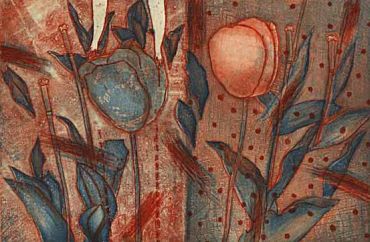
Holland in Japan
Print Works
Yuriko Miyoshi
via la main gauche
.....................................................
Canadian Tulip Festival 2008
May 2 - 19
_______________________
Ellipsis
Poetry and the Experience of Language after Heidegger, Holderlin and Blanchot
William S Allen
... it is at this point that we must start to differentiate the experience of reading from that of writing and in doing so provide a more concrete description of the nature of the language that is to be found in a poem. To help establish this inquiry on a more neutral, and thereby open, ground, I will turn to Maurice Blanchot’s use of “fiction” or “literature,” which in its generalized anonymity moves us away from the particularities of genre analysis—poetry as opposed to prose, for example—and toward the broader question of a language that does not act as an instrument of expression or communication.
download here _______________________
Collapse Volume IV: 'Concept Horror'
.....................................................
Jon Roffe reviews Collapse - Philosophical Research and Development [PDF]
It is no doubt strange to find the review of one journal in another. This strangeness is ameliorated, in this case, by the exceptional status of the journal in question. In most cases, it is the content of a journal alone which is of philosophical interest leaving aside the multitude of commercial, political and social aspects of every such publishing venture, which may be interesting but rarely contribute to an increase in the tone of the publication. In the case of Collapse, a different formal ambition is at work, and this is the principle reason for this review.
The strength of Collapse as a publishing enterprise lies in its attempt to populate theoretical spheres rather than extrapolate or `apply' philosophical positions to external matters. Such an approach ought not to be confused with the familiar `thematic' approach to philosophy, for indeed, this latter is nothing other than one form of applied philosophy, insofar as it takes the central matter of its discourse to be already established. parrhesia a journal of critical philosophy ISSUE 4, 2008
_______________________
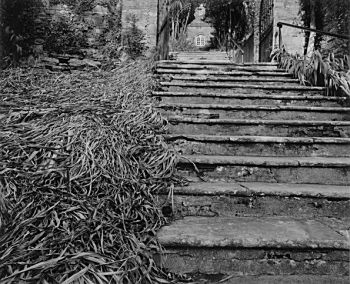
Brad Temkin
_______________________
Juniper and Bone
Old momma teach me moonlight
Old momma teach me skin
Old momma teach me timing
When the ocean crashes in
And momma teach me heartland
And teach me highway fear
Old momma teach me hunger
At the turning of the year
Old momma teach me nerve ends
Made of juniper and bone
Old momma teach me homing
To the certainty of stone.
– Dennis Lee
_______________________
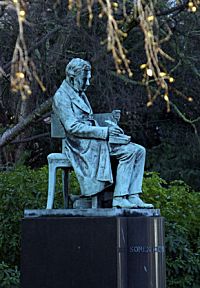
Søren Kierkegaard
May 5, 1813 - November 11, 1855
photo - John McConnico
Cowardice settles deep in our souls like the idle mists on stagnant waters. From it arise unhealthy vapors and deceiving phantoms. The thing that cowardice fears most is decision; for decision always scatters the mists, at least for a moment. Cowardice thus hides behind the thought it likes best of all: the crutch of time.
- Sören Kierkegaard
from Provocations: Spiritual Writings of Kierkegaard
Compiled and Edited by Charles E. Mooredownloadable here
Selections from the Writings of Kierkegaard
Translated by L.M. Hollander
_______________________
Risk, as a pure abstraction unconnected to any real capital activity, is all that's left to buy and sell after all other plausibly practical vehicles for finance have failed.
The Risk Economy
Jim Kunstler
For a while in the 1990s, the idea was a "service economy," kind of like the old fable of the town whose inhabitants made a living by taking in each other's laundry -- only in our case it was selling hamburgers to tourists on vacation from their jobs making hamburgers elsewhere, or something like that.
Then came the idea of the "information economy" in which making things of value would no longer matter, only the processing and deployment of information (sometimes misidentified as "knowledge"). This model seemed to suggest a yin-yang of software engineers who made up games like "Grand Theft Auto" serving the opposite cohort of people who bought and played the game. If nothing else, it certainly explained how lifetimes could be frittered away on stupid activities.
That illusion yielded to the housing bubble economy, which actually did produce a lot of things, but not necessarily of value -- for instance, houses made of particle board and vinyl 38 miles outside of Sacramento. It was a tragic and manifold waste of resources, as well as an insult to the landscape. But the darker side of the housing bubble lay in the world of finance, where a vast empire of swindles was constructed to support the Potemkin facade of production homebuilding. Now we are in a strange period when those swindles are unwinding....(more)
_______________________
 Nizhny Novgorod region
Psychology Of The Holiday
Valery Nistratov
photographer.ru
1 2
_______________________
Making Poverty Visible – Three Theses [PDF]
Alexander García Düttmann
translated by Arne De Boever
parrhesia
_______________________
Global famine? Blame the Fed
Mike Whitney
The stakes couldn't be higher for Ben Bernanke. If the Fed chief decides to lower rates at the end of April, he could be condemning millions of people to a death by starvation.
_______________________
Bullets and Bananas: The Violence of Free Trade in Guatemala
Cyril Mychalejko
_______________________
They Began to Call You
They began to call you, the rocks, breathing,
their innumerable visages, their gesticulant
throbbing,
from the cliff face. You could see
the entrance of the cave and you knew. Totems
fusing together. One
respiration over another. It’s for you. And what could it
have been?
And what would they have won from you and for what?
But you didn’t enter, only
stood there taking it in.
They Began to Call You and Other Poems
Coral Bracho
Translated from the Spanish by Forrest Gander
words without borders
_______________________
Walter Benjamin’s Archive
John Latta
License in Benjamin to snatch and hoard with a magpie’s bright indifference: “not to retain the new but to renew the old. And to renew the old—in such a way that I myself, the newcomer, would make what was old my own, as the task of the collections that filled my drawer.” Assimilating the perdurable, or, make the perdurable out of what’s select’d to assimilate. Or is the collectable, like memory, endless? “He who has once begun to open the fan of memory never comes to the end of its segments. No image satisfies him, for he has seen that it can be unfolded, and only in its folds does the truth reside—that image, that taste, that touch for whose sake all this has been unfurled and dissected; and now remembrance progresses from small to smallest details, from the smallest to the infinitesimal, while that which it encounters in these microcosms grows ever mightier.”...(more)
_______________________
“Falling out of one’s role with art” [PDF]
Samuel Weber on Benjamin’s -abilities
Interview by Arne De Boever and Alex Murray
parrhesia
Samuel Weber:
From his earliest until his latest writings, Walter Benjamin tends to form many of his key concepts by nominalizing verbs through the addition of the suffix "-ability": in German, " -barkeit." Examples are: communicability (with respect to language), criticizability (with respect to the Romantic notion of literature), translatability, reproducibility and cognizability. This gives a very particular cast to his manner of forming concepts: instead of seeking to designate what phenomena or processes have in common, such "-abilities" designate what Derrida once called a "structural possibility," a potentiality based not on what actually is but on what might be. Such concepts are thereby directed more toward a possible future than an already existing present. They put the emphasis therefore on the potential to transform reality - or on reality itself as a process of transformation. But they also reflect what I call a tendency to grasp such reality in terms of "media" or "mediality" - one could say "medi-ability" if it weren't such an ugly word - rather than in terms of accomplished "works." A medium, for Benjamin at least, is defined as a complex of relationships - today we might say "links" - rather than as an aggregate of self-contained, meaningful works or facts. Part of my project, in this book, is to retrace the genealogy of Benjamin's influential insights in the new media back to his relation to the traditional disciplines in which he was initially trained: philosophy, literary studies, art history, political theory. His tendency to "medialize" concepts through articulating them as "-abilities" prepares the way for his insights into the "new" media of photography, cinema and radio. But these insights are always dependent on the way he conceives of the "old" media, above all language, time and space.
_______________________
Inside Time’s Archive
Robert Gibbons
In order to get Inside Time’s Archive one enters through an extended Now: when… Contemplating this in the middle of the night, sharply insomniac, narrow alleys of memories of Paris resurface, parallel meanderings in Mexico, Canada, Ireland meet internal memories of home. .... Inside Time’s Archive corpuscular rivers wend, muscular experiences get reenacted, & archetypal threads weave between prehistory & the future. Inside Time’s Archive the confluence of body & geography writes language unearthing new flesh, new ground....(more)
_______________________

Oleg Moskvin

photo - mw
_______________________
The Slop Barrel:
Slices of the Paideuma for All Sentient Beings
Philip Whalen
By standing on the rim of the slop barrel
We could look right into the bird's nest.
Thelma, too little, insisted on seeing
We boosted her up
and over the edge
Head first among the slops in her best Sunday dress
Now let's regret things for a while
That you can't read music
That I never learned Classical languages
That we never grew up, never learned to behave
But devoted ourselves to magic
...(more)
.....................................................
“How Do You Like Your World?”
The Zen of Philip Whalen
Travis Nichols
_______________________
...where I grew up in the south, before the Civil Rights movement, the pulpit was a safe place for black men to express anger for which they would have been punished anywhere else. A safe place for the fierce thunder of dignity denied, justice delayed.
Shrink-Wrapping the Theology of Rev. Wright
Bill Moyers
Behold the double standard: John McCain sought out the endorsement of John Hagee, the war-mongering, Catholic-bashing Texas preacher, who said the people of New Orleans got what they deserved for their sins. But no one suggests McCain shares Hagee’s delusions or thinks AIDS is God’s punishment for homosexuality. Pat Robertson called for the assassination of a foreign head of state and asked God to remove Supreme Court Justices, yet he remains a force in the Republican religious right. After 9/11, Jerry Falwell said the attack was God’s judgment on America for having been driven out of our schools and the public square, but when McCain goes after the endorsement of the preacher he once condemned as an agent of intolerance, the press gives him a pass. Jon Stewart recently played tape from the Nixon White House in which Billy Graham talks in the Oval Office about how he has friends who are Jewish, but he knows in his heart that they are undermining America. This is crazy and wrong -- white preachers are given leeway in politics that others aren’t....(more)
_______________________

Eyewitness - Photographs by Howard Ruffner
Allison Krause stands under the Umbrella structure holding hands with her boyfriend, Barry Levine, as the National Guard advance up the hill to disperse students. Moments later, Allison would be killed.
Bitter Passage
Kent State and the Fall of Saigon
The Digital Journalist Kent State, May 4, 1970: America Kills Its Children
Documenting the May 1970 Kent State Shootings
_______________________
Distant Echoes of Vietnam
The Day I Lost My Innocence
William P. O'Connor
The perpetual conundrum of the old men who declare war is how to get the young boys to commit to the battle field. They have solved this conundrum by selling young boys on a counterfeit cause: freedom.
_______________________
 white lake pioneer cemetery
Hastings
photo - mw
_______________________
By all means
Frank Praeger
No fugue today,
no practised ardor
and I am not worried,
no castanets' hurried existence,
flowers refrain,
footsteps from a grave distance.
There is nothing to worry about,
not a single thought,
a not to be considered time-off
from being who I am.
I will not hold my breath,
I will not pass out
although the suddenness of today leaves me troubled.
Who's that,
who's that on the other side of nowhere?
...(more)
nthposition
_______________________
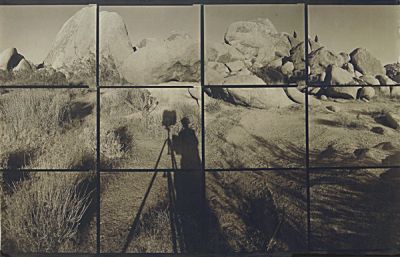 Joshua Tree
Koichiro Kurita 1 2 3
_______________________
Gods demand a great deal. This coming war
Nothing will be saved; they claim
It will rid the earth of human wickedness...
Nevertheless when we are vaporized
To descend as rain across strange countries
That we will never see
The roses will grow human ears for petals
To hear the savoy cabbages philosophize.
Philip Whalen

The Workers' May-Pole"
(1894)
Walter Crane's Children's Illustrations for the Cause
The Illustrated Word
_______________________
The Origins and Traditions of May Day
Eugene Plawiuk
La Revue Gauche
The Incomplete, True, Authentic and Wonderful History of May Day
Peter Linebaugh
The May-Pole of Merry Mount
From Twice-Told Tales
Nathaniel Hawthorne _______________________
Variations on Nothing
Giuseppe Ungaretti
Hudson Review, Spring 2002
That hardly anything of sand which slides Without a sound and settles in the hourglass, And the fleeting impressions on the fleshy-pink, The perishable fleshy-pink, of a cloud...
advertisement
Then a hand that turns over the hourglass, The going back by flowing back, of sand, The quiet silvering of a cloud In the first few lead-gray seconds of dawn ...
The hand in shadow turned the hourglass, And the hardly anything of sand that slides And is silent, is the only thing now heard, And, being heard, does not vanish in the dark.
_______________________

Toronto Music Garden
Leslie Turek
_______________________
Delirious Screens
Flesh Shadows & Cool Technology
Ted Hiebert
ctheory
Behind the screen, there is nothing. Not darkness, not fantasy, not even the flickering lights of consciousness aroused. And yet, within the screen, the case is quite the opposite -- here, within the delirium of technological living we encounter an intensified imaginary, new worlds of interactive possibility, in short, new opportunities for the falsification of being.
This provocation has strategic purpose, for the question of screen culture is less about the technological possibilities initiated by invention, and much more about the delirious seduction of a life screened-in. Here, amidst the growing participatory potential of interactivity, the icy prophecy of Marshall McLuhan's "cool technology" is brought to the cold light of the Lacanian mirror. For, as Lacan knew well, behind the mirror there is also nothing, which is why it becomes so urgent to invent a fantastic something to which technological effect can be attributed. The mirror, one might posit, is the first screen, the first "cool technology" -- the instance where the participatory performance of living first takes on its split dynamic between the "hot" social and cultural self and its "cool" other. (....)
We are flesh shadows -- no longer simply a function of an incontestable real. Instead, a screened-in persona is explicitly a manifestation of a censored meta-real, a cast shadow of imaginative possibility that becomes as real as we ourselves allow through an equally intensified relationship to interpretive, interactive living. This is a revival of the centuries-old principle of suspended disbelief, not this time on a safely detached cognitive plane, but in a shifting nebulous sublimated sphere. Not the suspension of disbelief in what Samuel Taylor Colleridge called the "moment of poetic faith," but in the very ongoing task of daily living -- suspended disbelief in the materialization of imaginary being itself....(more)
_______________________
Lost ways of looking at looking
Click opera
Links to all four episodes of John Berger's Ways of Seeing
"I actually find it rather disturbing that -- despite our claims to be a culture that's increasing freedom of choice all the time -- we haven't come up with anything quite as astute, subversive or beautiful as Ways of Seeing since. Not on the BBC, and not even -- especially not -- on the internet. Download it while you still can."
via MetaFilter
_______________________
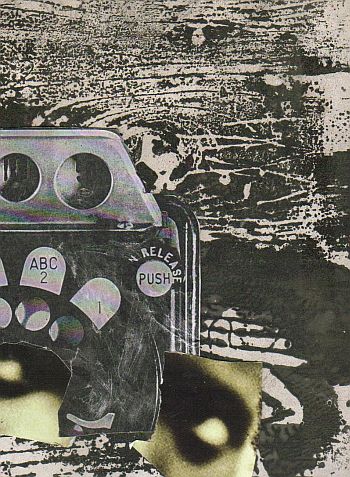
detail
The Cinema of Catharsis
otoliths
David-Baptiste Chirot
_______________________
SONG
Andrew Lundwall
otoliths
i want lips without pretense
scatalogical springtime
i want the scorpions in my eyes
to uncover the clocks that box us in
unclutter the glow in the inner
to realize sans compromise
...(more)
|












































